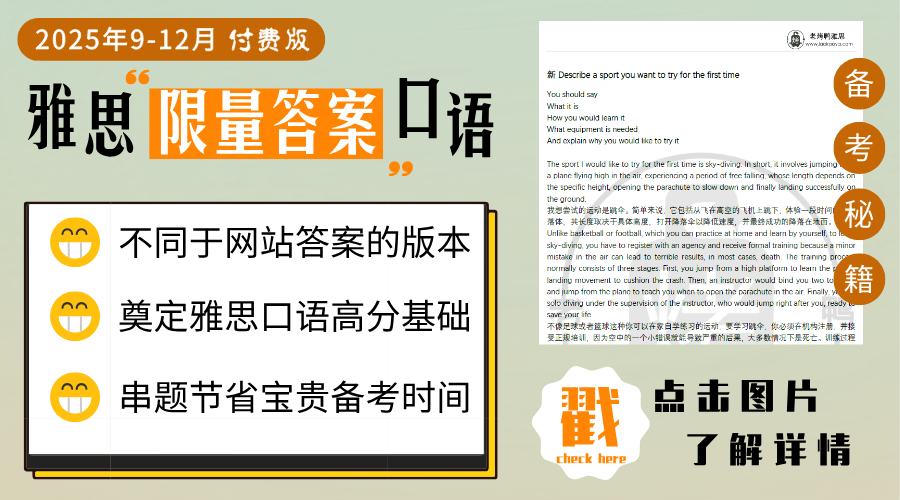剑桥雅思15Test4Passage3阅读原文翻译 Environmental practices of big business 大企业的环保实践
剑桥雅思15阅读第四套题目第三篇文章的主题为大企业的环保责任。文章一共7段,主要探讨了公众在迫使企业采取环保措施中的地位,以及能够采取的各种措施。下面是具体每一段的翻译。
点击查看这篇雅思阅读具体题目的答案解析与其中出现的高频词汇:
雅思阅读真题词汇 剑桥雅思15 Test 4 Passage 3 大企业的环保责任
剑桥雅思15Test4Passage3阅读答案解析 environmental practices of big business 大企业的环保实践
剑桥雅思15 Test4 Passage3阅读原文翻译
第1段
The environmental practices of big businesses are shaped by a fundamental fact that for many of us offends our sense of justice. Depending on the circumstances, a business may maximize the amount of money it makes, at least in the short term, by damaging the environment and hurting people. That is still the case today for fishermen in an unmanaged fishery without quotas, and for international logging companies with short-term leases on tropical rainforest land in places with corrupt officials and unsophisticated landowners. When government regulation is effective, and when the public is environmentally aware, environmentally clean big businesses may out-compete dirty ones, but the reverse is likely to be true if government regulation is ineffective and if the public doesn’t care.
大企业的环保行为受一项基本事实的影响。而对于我们大多数人来说,该事实则冒犯到我们对公平正义的认知。根据具体环境的不同,一家企业可能会通过破坏环境和伤害人民的方式来使其利润最大化,至少在短期内如此。如今当渔民在不受管理、没有配额的渔场捕鱼时,当拥有短期租约的伐木公司在官员腐败、土地所有者缺乏经验的热带雨林中砍伐时,这种情况仍然会发生。当政府管理有效,公众具有环保意识时,不会造成环境污染的大企业可能会战胜污染严重的企业。但如果政府管理不善,而且公众不在乎的话,相反的情况也有可能发生。
第2段
It is easy for the rest of us to blame a business for helping itself by hurting other people. But blaming alone is unlikely to produce change. It ignores the fact that businesses are not charities but profit-making companies, and that publicly owned companies with shareholders are under obligation to those shareholders to maximize profits, provided that they do so by legal means. US laws make a company’s directors legally liable for something termed ‘breach of fiduciary responsibility’ if they knowingly manage a company in a way that reduces profits. The car manufacturer Henry Ford was in fact successfully sued by shareholders in 1919 for raising the minimum wage of his workers to $5 per day: the courts declared that, while Ford’s humanitarian sentiments about his employees were nice, his business existed to make profits for its stockholders.
对于我们来说,指责一家公司损人利己是件很容易的事情。但指责本身不会产生改变。它忽视了如下事实:企业不是慈善机构而是赚取利润的公司,而拥有股东的上市公司有义务在法律许可的范围内为股东实现利润最大化。美国法律规定,如果一家公司的董事在管理公司期间故意降低公司利润,那么他们就需要为所谓的“违反受托责任”承担法律责任。事实上,汽车制造商亨利·福特就曾在1919年因将工人的最低工资提升至每天5美元而被股东成功起诉。法庭宣布,虽然福特对其员工的人文关怀是好的,但其公司存在的意义就是为了给股东赚取利润。
第3段
Our blaming of businesses also ignores the ultimate responsibility of the public for creating the conditions that let a business profit through destructive environmental policies. In the long run, it is the public, either directly or through its politicians, that has the power to make such destructive policies unprofitable and illegal, and to make sustainable environmental policies profitable.
我们对企业的指责也忽视了公众的最终责任,是他们创造出相应的条件,让企业可以通过破坏环境的政策来赚取利润。长期来看,无论是直接参与也好,通过政客也好,只有公众才有权力让这些破坏性的政策变得无利可图或者违背法律,让可持续的环保政策能够盈利。
第4段
The public can do that by suing businesses for harming them, as happened after the Exxon Valdez disaster, in which over 40,000 m3 of oil were spilled off the coast of Alaska. The public may also make their opinion felt by preferring to buy sustainably harvested products; by making employees of companies with poor track records feel ashamed of their company and complain to their own management; by preferring their governments to award valuable contracts to businesses with a good environmental track record; and by pressing their governments to pass and enforce laws and regulations requiring good environmental practices.
公众可以通过起诉企业伤害他们来实现这一点,正如埃克森·瓦尔迪兹灾难发生之后那样。当时超过40000立方的石油在阿拉斯加海岸泄漏。公众也可以通过以下方式让自己的意见被听到,如更加倾向于购买可持续收获的产品;让那些拥有不良记录的公司员工为他们的公司感到羞愧并向他们的管理层抱怨;推动政府将价值连城的合同奖励给那些环境保护记录良好的公司;以及迫使政府通过并执行要求良好环保实践的法律和规定。
第5段
In turn, big businesses can exert powerful pressure on any suppliers that might ignore public or government pressure. For instance, after the US public became concerned about the spread of a disease known as BSE, which was transmitted to humans through infected meat, the US government’s Food and Drug Administration introduced rules demanding that the meat industry abandon practices associated with the risk of the disease spreading. But for five years the meat packers refused to follow these, claiming that they would be too expensive to obey. However, when a major fast-food company then made the same demands after customer purchases of its hamburgers plummeted, the meat industry complied within weeks. The public’s task is therefore to identify which links in the supply chain are sensitive to public pressure: for instance, fast-food chains or jewelry stores, but not meat packers or gold miners.
反过来说,大企业可以对任何忽视公众或政府要求的供应商施加强大的压力。例如,在美国公众开始关心一种名为BSE的疾病的传播之后(它通过受感染的肉类传递给人类),美国政府食品和药品管理局就出台规定,要求肉制品行业放弃可能涉及疾病传播风险的做法。但是,有5年的时间,肉类加工商拒绝遵守这些规定,声称遵守规定的成本太高。然而,当一家大型快餐公司在消费者对其汉堡包的购买量大幅下降之后也提出相应的要求时,肉制品行业在几周的时间里就屈从了。因此,公众的任务是找出供应链的哪部分对公众压力敏感:例如快餐连锁店或者珠宝店,而非肉类加工商或金矿主。
第6段
Some readers may be disappointed or outraged that I place the ultimate responsibility for business practices harming the public on the public itself. I also believe that the public must accept the necessity for higher prices for products to cover the added costs, if any, of sound environmental practices. My views may seem to ignore the belief that businesses should act in accordance with moral principles even if this leads to a reduction in their profits. But I think we have to recognize that, throughout human history, in all politically complex human societies, government regulation has arisen precisely because it was found that not only did moral principles need to be made explicit, they also needed to be enforced.
一些读者可能对我将企业实践伤害公众的最终责任置于公众自身感到失望或者愤怒。我也认为公众必须接受提高产品价格的必要性,以弥补健全环保实践所带来的额外成本(如果有的话)。我的观点可能忽视了如下信念,即企业应该按照道德原则运营,即便这会导致利润下降。但我认为,我们必须意识到,纵观人类历史,在所有政治复杂的人类社会中,政府各项规章制度诞生的确切原因就在于,人们发现道德原则不仅要清晰明了,而且还需要强制执行。
第7段
To me, the conclusion that the public has the ultimate responsibility for the behavior of even the biggest businesses is empowering and hopeful, rather than disappointing. My conclusion is not a moralistic one about who is right or wrong, admirable or selfish, a good guy or a bad guy. In the past, businesses have changed when the public came to expect and require different behavior, to reward businesses for behavior that the public wanted, and to make things difficult for businesses practicing behaviors that the public didn’t want. I predict that in the future, just as in the past, changes in public attitudes will be essential for changes in businesses’ environmental practices.
对我来说,公众对大型企业的行为负有最终责任这一结论充满希望并给人以力量,而不是让人感到失望。我的结论与谁对谁错,谁值得敬佩谁自私,谁是好人谁是坏人等道德判断无关。过去,在公众期望并要求不同行为时,企业会进行改变。这些要求会奖励那些采取公众想要行为的公司,并给采取公众不想要行为的公司造成困难。我预测,未来就跟过去一样,公众态度的改变对于企业环保行为的变化至关重要。
剑桥雅思15Test4Passage1阅读原文翻译 The return of the huarango Huarango树的回归
剑桥雅思15Test4Passage2阅读原文翻译 Silbo Gomero – the whistle language of the Canary Islands 加那利群岛的口哨语言





